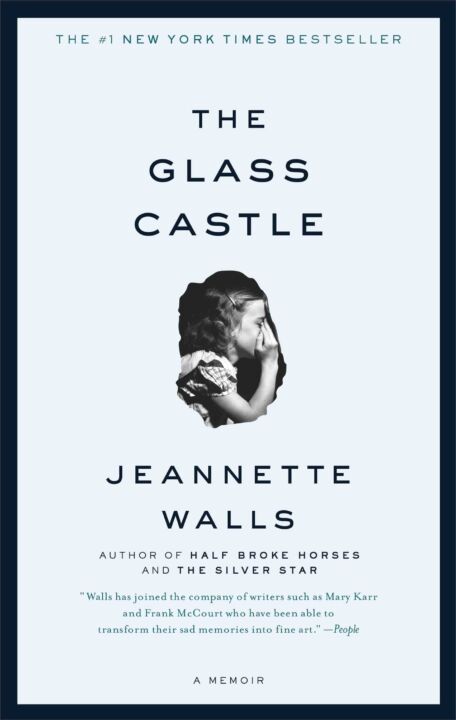Title: The Glass Castle
Author: Jeannette Walls
Publisher: Scribner
Genre: Memoir
First Publication: 2005
Language: English
Major Characters: Jeannette Walls, Rex Walls, Rose Mary Walls, Maureen Walls, Brian Walls, Lori Walls
Setting Place: American Southwest; Welch, West Virginia; New York City
Theme: Growing Up, Illusion, and Disillusion; Possessions and Ownership; Responsibility, Self-Sufficiency, and Non-Conformity
Narrator: First person
Book Summary: The Glass Castle by Jeannette Walls
The Glass Castle by Jeannette Walls is a remarkable memoir of resilience and redemption, and a revelatory look into a family at once deeply dysfunctional and uniquely vibrant. When sober, Jeannette’s brilliant and charismatic father captured his children’s imagination, teaching them physics, geology, and how to embrace life fearlessly. But when he drank, he was dishonest and destructive. Her mother was a free spirit who abhorred the idea of domesticity and didn’t want the responsibility of raising a family.
The Walls children learned to take care of themselves. They fed, clothed, and protected one another, and eventually found their way to New York. Their parents followed them, choosing to be homeless even as their children prospered.
The Glass Castle is truly astonishing—a memoir permeated by the intense love of a peculiar but loyal family.
The book, The Glass Castle by Jeannette Walls, is also available on Audible. It’s narrated Jeannette Walls herself.

Book Review: The Glass Castle by Jeannette Walls
The Glass Castle by Jeannette Walls is a stunning memoir, hard to put down. Walls is superb with details, a true genius. She is a fine example of a self-made, successful person. But throughout most of the book, I was so angry with the parents, her mother in particular:
When the kids had nothing to eat, she hid a king-sized Hershey bar in her bed for herself. She had an excuse for her behavior, whining that she’s a “sugar addict.” (And later, she refuses to get a job or keep one, when she gets them; because she’s an “excitement addict.” Really, it seems like she’s rather immature and lazy. How exciting is it to sleep all day or have tantrums about blaming her children for her failures as an artist?)
“Things usually work out in the end.”
“What if they don’t?”
“That just means you haven’t come to the end yet.”
When Brian and Jeannette found the diamond ring, they could have used it to buy necessities like food and clothes, but their mother needed it for her precious self-esteem. She really lacks motivation to get up and do something about their deplorable living conditions, but is too selfish to do so.
When Uncle Stanley groped Jeannette, her mother didn’t seem too concerned and actually felt sorry for the uncle, believing him to be lonely!
She refuses Welfare, despite the fact that her pride is harming her children, a form of child abuse and negligence. They are living in squalor but it’s supposed to be an “adventure.” The house is filthy with the mold, trash, mushrooms growing in the corners, and the lack of heat and indoor plumbing. It is not an acceptable environment and I’m surprised the gov’t man didn’t come back. If you really love your children, you should provide for them, even if you hate charity. Instead, she spends most of her time feeling sorry for herself, if she isn’t pursuing her true calling as an artist.
“You should never hate anyone, even your worst enemies. Everyone has something good about them. You have to find the redeeming quality and love the person for that.”
And when she doesn’t go back to one of her teaching jobs, she reasons, “It’s time I did something for myself. It’s time I started living my life for me. Why do I have to earn the money? You [Jeannette] have a job.” It just made me so angry to hear her talk that way to her own daughter. She has no sense of responsibility. “I’ve got more important things to do,” she also said.
For all her artistic ideals, she is whiny, pathetic, seems to care more about strangers and stray animals than her children. And it was ridiculous how she didn’t want to kill the flies and cockroaches, and felt sorry for the big rat in the sugar bowl. She is encouraging the unhealthy conditions by keeping pests alive, so it seems that while she doesn’t want to deprive insects and animals of food (“they need to eat too”), it’s ok if her children starve.
“Life is a drama full of tragedy and comedy. You should learn to enjoy the comic episodes a little more.”
And no, I’m not forgetting the father. I must admit that I had a soft spot for him, despite his alcoholism. He at least attempted to be a father, showing love to Jeannette and making her feel special, educating her on many subjects. He was more interested in her life than her mother was. Definitely not a saint, but much more likeable than the mom in my view.
The Glass Castle by Jeannette Walls is quite an interesting and thought-provoking book and one that will most likely become required reading as it focuses on survival and reveals how young people today no longer rely on their instincts. Their own survival skills are not tested since they are provided with every opportunity, and an overabundance of choices which could possibly take away the chances of their ability to “make it on their own” once they step into the real world.





